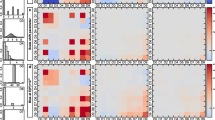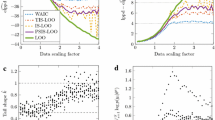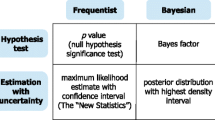Abstract
The problem of consistent estimation of regression coefficients in a multivariate linear ultrastructural measurement error model is considered in this article when some additional information on regression coefficients is available a priori. Such additional information is expressible in the form of stochastic linear restrictions. Utilizing stochastic restrictions given a priori, some methodologies are presented to obtain the consistent estimators of regression coefficients under two types of additional information separately, viz., covariance matrix of measurement errors and reliability matrix associated with explanatory variables. The measurement errors are assumed to be not necessarily normally distributed. The asymptotic properties of the proposed estimators are derived and analyzed analytically as well as numerically through a Monte Carlo simulation experiment.
Similar content being viewed by others
References
Cheng CL, Kukush A (2006) Non-existence of the first moment of the adjusted least squares estimator in multivariate errors-in-variables model. Metrika 64(1): 41–46
Cheng CL, Ness JW (1991) On the unreplicated ultrastructural model. Biometrika 78: 442–445
Cheng CL, Ness JW (1999) Statistical regression with measurement errors. Arnold Publishers, London
Gruijter DN, Kamp LJTh (2008) Statistical test theory for the behavioral sciences. Chapman & Hall/CRC Press, London/West Palm Beach
Dolby GR (1976) The ultrastructural relation: a synthesis of the functional and structural relations. Biometrika 63: 39–50
Dunn G (1989) Design and analysis of reliability studies. Oxford University Press, New York
Fuller WA (1987) Measurement error models. Wiley, New York
Gleser LJ (1992) The importance of assessing measurement reliability in multivariate regression. J Am Stat Assoc 87(419): 696–707
Gleser LJ (1993) Estimators of slopes in linear errors-in-variables regression models when the predictors have known reliability matrix. Stat Probab Lett 17: 113–121
Rao CR, Rao MB (1998) Matrix algebra and its applications to statistics and econometrics. World Scientific, Singapore
Rao CR, Toutenburg H, Shalabh, Heumann C (2008) Linear models and generalizations: least squares and alternatives, 3rd edn. Springer, New York
Schaffrin B (2006) A note on constrained total least-squares estimation. Linear Algebra Appl 417: 245–258
Schneeweiss H (1976) Consistent estimation of a regression with errors in the variables. Metrika 23: 101–115
Schneeweiss H (1982) A simple regression model with trend and error in the exogenous variable. In: Deistler M, Fuest E, Schwodiauer G (eds) Games, economic dynamics and time series analysis. Physica-Verlag, Wurzburg, pp 347–358
Schneeweiss H (1991) Note on a linear model with errors in the variables and with trend. Stat Papers 32: 261–264
Shalabh (1998) Improved estimation in measurement error models through Stein-rule procedure. J Multivar Anal 67:35–48 (Corrigendum: J Multivar Anal 74:162, 2000)
Shalabh (2003) Consistent estimation of coefficients in measurement error models under non-normality. J Multivar Anal 86(2):227–241
Shalabh, Gleser GL, Rosen O (2004) On the usefulness of the knowledge of error variances in the consistent estimation of an unreplicated ultrastructural model. J Stat Comput Simul 74(6):391–417
Shalabh, Garg G, Misra N (2007) Restricted regression estimation in measurement error models. Comput Stat Data Anal 52(2):1149–1166
Srivastava AK, Shalabh (1997a) Consistent estimation for the non-normal ultrastructural model. Stat Probab Lett 34:67–73
Srivastava AK, Shalabh (1997b) Asymptotic efficiency properties of least squares in an ultrastructural model. Test 6(2):419–431
Srivastava VK, Tiwari R (1976) Evaluation of expectation of product of stochastic matrices. Scand J Stat 3: 135–138
Theil H, Goldberger AS (1961) On pure and mixed estimation in econometrics. Int Econ Rev 2: 65–78
Toutenburg H (1982) Prior information in linear models. Wiley, New York
Wong MY (1989) Likelihood estimation of a simple linear regression model when both variables have error. Biometrika 78: 141–148
Author information
Authors and Affiliations
Corresponding author
Rights and permissions
About this article
Cite this article
Shalabh, Garg, G. & Misra, N. Consistent estimation of regression coefficients in ultrastructural measurement error model using stochastic prior information. Stat Papers 51, 717–748 (2010). https://doi.org/10.1007/s00362-008-0162-z
Received:
Accepted:
Published:
Issue Date:
DOI: https://doi.org/10.1007/s00362-008-0162-z
Keywords
- Consistent estimation
- Measurement errors
- Reliability matrix
- Stochastic linear restriction
- Ultrastructural model




